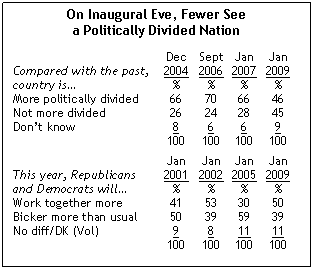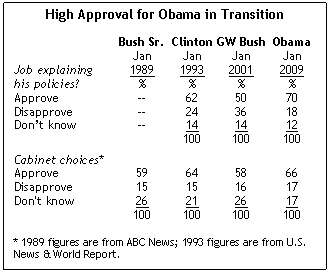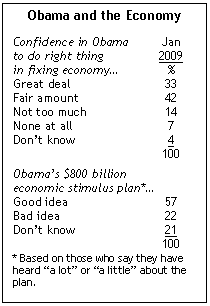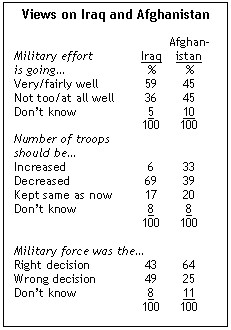Overview
Public confidence in Barack Obama to deal with the nation’s most pressing problems is quite high, with about seven-in-ten saying they have at least a fair amount of confidence that he will do the right thing when it comes to mending the economy, preventing terrorism, and in dealing with Iraq. Notably, many Americans not only see the president-elect as a problem-solver, but as a “uniter” as well.

For the first time in several years, there has been a sharp decline in the proportion of Americans who say the country is more politically divided than in the past. Fewer than half (46%) now see the country as more divided, down 20 points from January 2007 (66%).
Moreover, the percentage saying that Republicans and Democrats in Washington will work together more to solve problems, rather than bicker and oppose each other, is markedly higher than it was at the start of either of President Bush’s two terms. Currently, 50% say the two parties will work together more to solve problems, while 39% expect more partisan bickering. Four years ago, just 30% said the two parties would work cooperatively while nearly twice as many (59%) said they anticipated more partisan bickering. Public expectations for partisan cooperation are now as great as in January 2002, amid the mood of national unity that prevailed after the Sept. 11 attacks.
Democrats are particularly optimistic about prospects for partisan cooperation: 59% of Democrats say they expect the two parties to work together more, compared with 49% of independents and 40% of Republicans.
These trends may well reflect strikingly different perceptions of the partisan influences on President-elect Obama and President Bush. A 44% plurality says that when it comes to matters of national policy, Obama listens more to moderate members of his party, while 34% believe he listens more to liberals in his party. This is in sharp contrast to how President Bush has been viewed. Throughout most of his presidency, but particularly in his second term, Bush has been viewed as listening more to conservatives than moderates in his party.
The latest national survey by the Pew Research Center for the People & the Press, conducted Jan. 7-11 among 1,503 adults on cell phones and landlines, finds that Americans are enthusiastic about Obama and broadly approve of his handling of the presidential transition. Fully 79% of Americans – including 59% of Republicans – say they have a favorable impression of Obama. That is far higher than Bush’s personal favorability shortly before he took office in 2001 (60%).

Seven-in-ten (70%) approve of the job Obama has done in explaining his plans and policies for the future. This rating tops those achieved by both George W. Bush and Bill Clinton as they were taking office.
About two-thirds of Americans (66%) approve of Obama’s choices for his cabinet and other high-level posts. While that is slightly lower than the proportion saying this in December (71%), it exceeds positive ratings for the cabinet selections of both George W. Bush (58%) and his father (59%), and is on par with approval of Bill Clinton’s cabinet picks in January 1993 (64%).
As is typically the case at this stage, most Americans think it is too early to tell whether Obama will be a successful or unsuccessful president. Yet optimists far outnumber pessimists (30% successful vs. 4% unsuccessful). At a comparable point in 2001, 26% said they expected Bush to be successful, compared with 15% who said he would be unsuccessful.

Large majorities say they have at least some confidence in Obama’s judgment on the big issues facing the country – including 75% who say they have a great deal (33%) or a fair amount (42%) of confidence in Obama to do the right thing to fix the economy. His economic stimulus package, which has not been finalized but may total about $800 billion, is viewed as a good idea by 57% of those who have heard something about the plan. However, a small plurality of Republicans who have heard about the plan (43%) view the emerging proposal as a bad idea – perhaps an indication that the anticipated era of partisan cooperation may be short-lived.
Despite the troubled economy, Americans are about as optimistic about the coming year as they were at about this point a year ago. Currently, 52% say they expect that 2009 will be better than 2008, which is about the same as the percentage saying that about a year ago (50% in December 2007). Two years ago, in looking ahead to 2007, 57% expected that year to be an

improvement from 2006.
The survey also finds continuing concern about the situation in Afghanistan. Far more people now believe that the military effort in Iraq is going very or fairly well than say the same about the U.S. operation in Afghanistan (59% vs. 45%).
The public’s views on other aspects of the two wars also are in sharp contrast: while a large majority (69%) favors decreasing the number of U.S. troops in Iraq, there is no consensus regarding troop levels in Afghanistan. Nearly four-in-ten (39%) say the number of U.S. troops there should be decreased, while 33% say the number of forces should be increased and 20% favors keeping the number of troops the same as it is now.
Winners and Losers in New Era
The public’s belief that Washington will change dramatically under the new president is seen in the groups that are expected to gain and lose influence during Obama’s presidency. The list of perceived winners and losers is very different than for Bush’s administration in January 2001 and more closely resembles the predicted winners and losers for Clinton’s presidency in 1993.

Fully 73% say that poor people will gain influence, while just 8% say they will lose influence. Prior to both of Bush’s terms, pluralities said that poor people would lose influence (40% in January 2001, 49% in January 2005). Before Clinton took office, 61% said poor people would gain influence.
Other predicted winners under Obama’s presidency are younger people (71% gain influence), blacks (67%), children (64%), environmentalists (60%) and women (58%). Nearly half (47%) say that “people like yourself” will gain influence; that is greater than the percentages saying average people would gain influence under Bush’s presidency in 2001 (35%) and 2005 (22%).
More than four-in-ten say that wealthy people (44%) and business corporations (42%) will lose influence under Obama’s administration, the highest percentages for any group tested. A 38% plurality also says that Washington lobbyists will lose influence under the new president.




